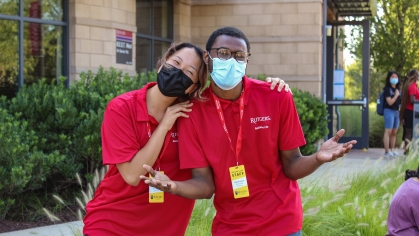
During Rutgers University’s remote instruction, Rutgers Residence Life faced the challenge of continuing to engage and support residential communities in a largely virtual world.
Division of Student Affairs Adapts to COVID-19
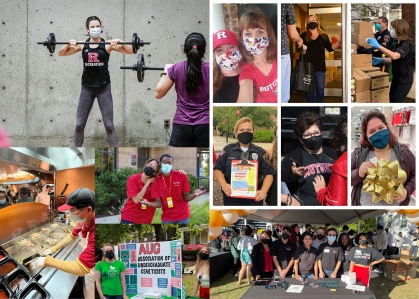
When, in March 2020, Rutgers University–New Brunswick went remote as a result of the COVID-19 pandemic, no department in Student Affairs could have predicted the next two months, let alone the next two years.
Each department adapted its services and operations to continue serving students in response to the pandemic. Many staff across the division and the university remained on campus from the beginning of the pandemic, ensuring that critical on-campus services and operations remained available. Together, they strived to meet students' physical, mental, and emotional needs fueled by a shared spirit of collaboration and purpose.
For example, to provide on-campus and off-campus students with weekly COVID-19 testing, Student Health coordinated with Residence Life, Off-Campus Living and Community Partnerships (OCLCP), and the Office for Fraternity and Sorority Affairs (OFSA).
At residence hall testing sites, Residence Life Coordinators (RLCs) reached out to students in a face-to-face setting, checking in on their academic progress and following up on any residential concerns, while OCLCP provided door-to-door outreach to off-campus residents, handing out masks and distributing literature about safety and available resources.
We really appreciated the support that we got across the Division of Student Affairs. I have never felt so comfortable asking for help, which speaks volumes to the quality of the people working here.
Kerri Wilson, director of the OCLCP
This collaborative spirit was visible throughout the Division of Student Affairs. In order to feed students in Fall 2020, Dining Services and Off-Campus Living adopted complementary strategies.
While Dining Services implemented an online ordering system for food pickup and delivered meals to students in quarantine and isolation, Off-Campus Living, with the assistance of student affairs staff volunteers, adapted their operations to keep the Student Food Pantry open throughout the pandemic and started a mobile food pantry to better serve food insecure students unable to travel between campuses.
“We really appreciated the support that we got across the Division of Student Affairs,” said Kerri Wilson, director of the OCLCP. “I have never felt so comfortable asking for help, which speaks volumes to the quality of the people working here.”
In conjunction with this spirit of collaboration, many departments transitioned their operations online to better meet the needs of their students.
Rutgers Recreation developed a catalogue of asynchronous and live online fitness classes, offered professional development opportunities online, and transitioned the 2020 Rutgers Big Chill 5K—a long-standing Rutgers tradition—into a virtual format. Through the Big Chill, Recreation was also able to raise funds for both the Student Food Pantry and Winter Wishes, a program supplying New Brunswick preschool children with gifts for the holiday season that their families may not be able to provide.
Student Centers and Activities made a similar jump, hosting a remote Involvement Fair twice during the pandemic and maintaining student engagement through the online delivery of its programs.
At times, online participation exceeded department expectations. For some services, such as community-based counseling services offered by the Cultural Centers through a strategic partnership with Counseling & Psychiatric Services (CAPS) of Student Health, the Centers saw an increase in utilization of their services.
“During the pandemic, there was a lot more anxiety and depression among our student population,” said Cathryn Heath, director of Student Health. “CAPS had some excellent programs on how to alleviate those issues during the pandemic that were vitally important for students.”
As it reached out to students, the Division of Student Affairs also focused on actively fostering inclusive communities and promoting equity.
“The Cultural Centers tried to create an inclusive environment for students,” said Ji Lee, the executive director of intercultural engagement and inclusion initiatives. “That includes our programs, the language that we’re using, and how we show up and listen to what our students need.”
As a division, we don’t stray away from listening and learning from our students. And not only does Student Affairs listen, but we also actively show up and support students.
Karima Woodyard, director of involvement within Student Centers and Activities
As well as responding to the needs of students during the pandemic, the Cultural Centers also responded to the needs of students in the aftermath of the murder of George Floyd, helping students organize a well-attended in-person march and an online memorial service that also had significant participation.
In addition to the Cultural Centers, Student Centers and Activities, observing an uptick in conflict and disagreement between its student organization leaders, created Diversity, Equity, and Inclusion (DEI) training for student organizations, while Residence Life managed community conversations about socio-economic privilege, addressed microaggressions, educated residents on potential bias, and provided a space to ask questions.
"As a division, we don’t stray away from listening and learning from our students," said Karima Woodyard, director of involvement within Student Centers and Activities. “And not only does Student Affairs listen, but we also actively show up and support students.”
Just as Rutgers–New Brunswick transitioned back into in-person learning this fall and spring, much in Student Affairs has transitioned back to in-person programming during the same period of time, while still maintaining an active online presence in support of social distancing and student preference for virtual services.
In the fall, Student Centers and Activities hosted the Student Involvement Fair and the Cultural Centers held CultureFest on the Voorhees Mall. The Big Chill Charity 5K from Rutgers Recreation returned to College Ave with 2,000 in-person runners and many virtual participants, and the Scarlet Day of Service from the Rutgers University Programming Association was held in both the fall and the spring. Student Affairs plans to hold a variety of other in-person events, including Hot Dog Day on April 20 and multiple graduation ceremonies in early May from the Cultural Centers.
Still, key lessons from the past two years continue to reverberate through the Division of Student Affairs. Student insights shape the in-person offerings, and departments throughout the division continue both virtual and hybrid offerings to better meet the needs of students.
“Members of our division have put in a lot of work to support our students while attending to their own well-being,” said Woodyard. “I’m proud of the work that we’ve done and continue to do despite the challenges we continue to experience because of the ongoing pandemic.”
How We Serve the Rutgers Community
Read more about how the areas mentioned in this story adapted their services to serve Rutgers students and the community.

During Rutgers University’s remote instruction, Rutgers Residence Life faced the challenge of continuing to engage and support residential communities in a largely virtual world.
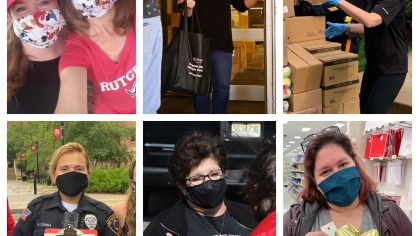
Throughout the pandemic, Dining Services and the Student Food Pantry played an active and important role in providing students with a basic necessity: food.
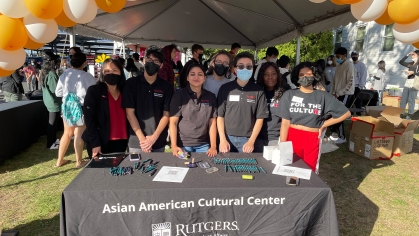
The Cultural Centers are devoted to maintaining a welcoming atmosphere for students, which was especially true during the COVID-19 pandemic.
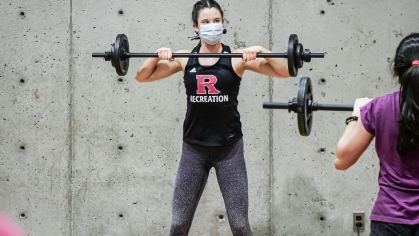
In March 2020, as part of its response to the COVID-19 pandemic, Rutgers Recreation, like other departments at Student Affairs, had to transition to a new normal with a variety of programs, initiatives, and accommodations.
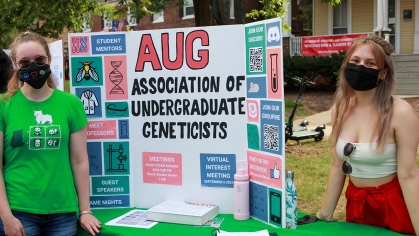
In March 2020, with the emergence of COVID-19 and the subsequent move to remote instruction, professional staff and student organizations had to provide virtual programming in order to maintain student engagement.
Financial support from alumni, parents, and friends helps us create the innovative learning opportunities that challenge students to be their best at Rutgers and beyond.
About the Division of Student Affairs at Rutgers–New Brunswick
The Division of Student Affairs is committed to facilitating interactions that promote students' success and their personal and professional development. Learn more about our mission.